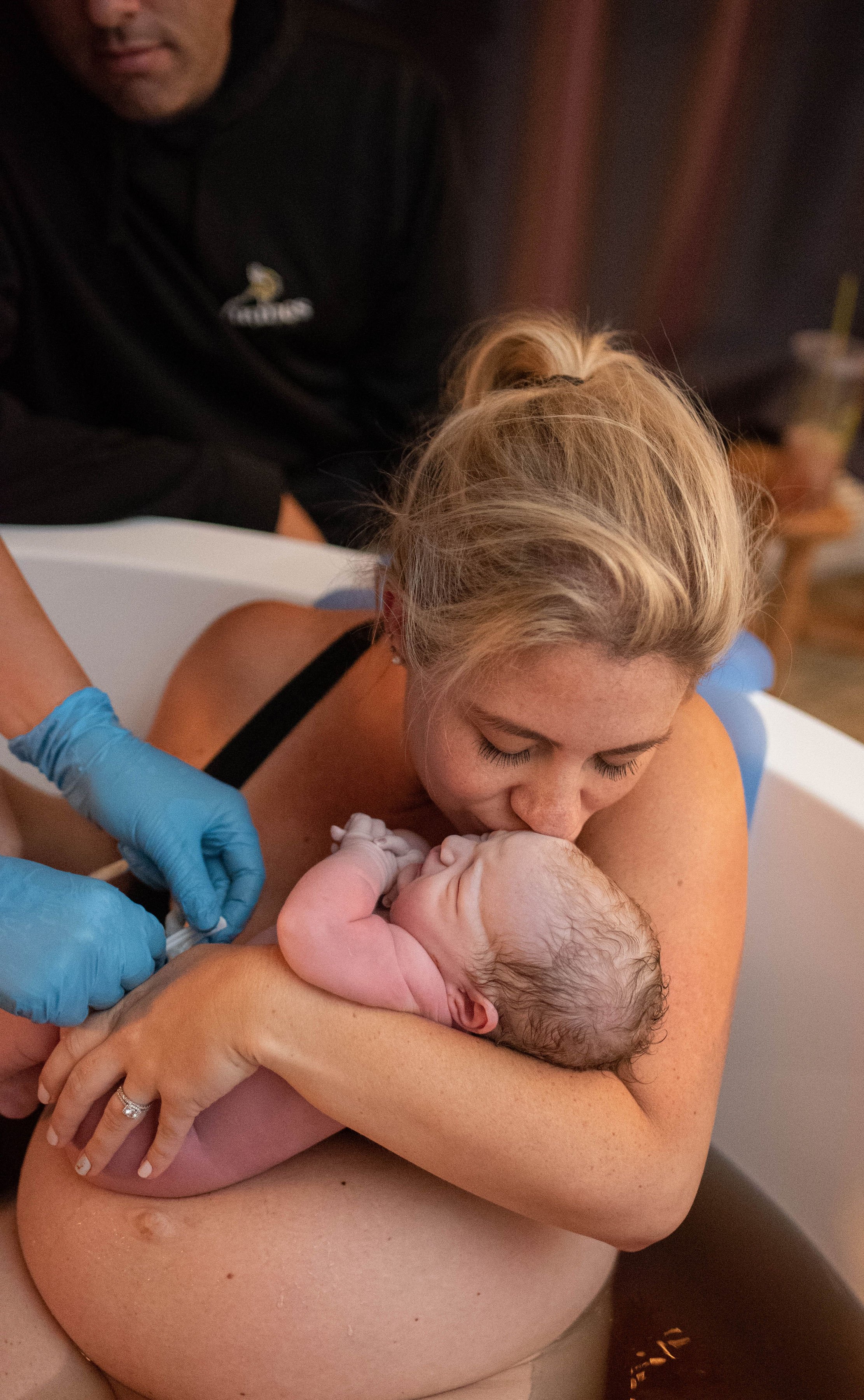
Homebirth FAQs
-
All prenatal visits (10-13), the birth, 1-3 postpartum visits, lactation support, and routine newborn care for the first 28 days of life.
-
Full set of baseline health labs at the first OB visit, 28 week testing for gestational diabetes and anemia, and GBS testing.
-
Birth happens best when women feel supported and safe. Having your baby in your own safe space is a natural way to achieve that feeling of safety and support needed for labor.
Getting tucked into your own bed, with a fresh new baby, in the comfort of your home and with your family close by is absolutely priceless.
We come to you for your newborn’s first visits, so no need to pack up in the deep Midwest winter and venture out into the cold with a newborn.
-
Midwifery-led planned home birth is a wonderful and safe option for low-risk women.
A recent study was published following nearly 17,000 midwifery-led, planned home births in the United States. Outcomes showed that low-risk women in this study experienced high rates of physiologic birth and low rates of intervention without an increase in adverse outcomes.
To read more about this study, click here.
-
We bring the same emergency medications and resuscitative equipment that we would have in the hospital.
We might look like we are moving in when we arrive, but there is a method to our madness! Most of the time, we do not need this equipment, but we are always prepared.
-
It is very unlikely that your home is too small to give birth in! Having a baby does not require a lot of space. In fact, your home may give you more room than a traditional hospital room!
You will need a place large enough to lie down and space around you so your midwives are able to access you and set up their equipment. The size of your home isn’t important; what matters is that you feel safe and comfortable there.
-
You will be able to purchase a home birth kit that is tailored to our practice. It will supply you with everything you need at home as well as any recovery items needed for you postpartum stage.
-
The mess is not as bad as you might think! We have creative ways of protecting your furniture and our team will take care of the clean-up. Usually, a birth only produces about one load of laundry and one garbage bag!
-
Anyone YOU would like to be there!
-
You do not need to clean or sterilize your home to have a baby there.
-
Hydrotherapy
Massage
Relaxation & Breathing Techniques
Hypnotherapy
TENs unit
Sterile Water Injections
-
The World Health Organization estimates that around 15% of all pregnant women will develop a complication that calls for skilled care and some will require major obstetrical intervention.
We will advise and discuss with you if there is a need for transfer to the hospital. A plan for transfer is put in place during the prenatal period after a discussion on which would be the most appropriate hospital for transfer.
The majority of hospital transfers during labor are for reasons that are not emergent: such as prolonged labor or desire for additional pain interventions.
Midwives are trained to recognize early signs when something is not right. The reason for transfer could relate to you or your baby.
If you have concerns about this, please reach out to us and we would be more than happy to answer whatever questions you might have.
-
Item description
Hormone & Functional Medicine FAQs
-
We approach HRT with a holistic and functional medicine-based perspective. We combine functional lab testing, diet, and nutritional support. It is very important to us to look at the whole picture of the hormone cascade in order to provide the right hormonal support. When the ovaries shut down, they no longer produce estrogen and progesterone. This means the adrenals have the heavy burden of taking over a lot of the hormonal work. Therefore, it’s important to support the adrenals before, during, and after menopause.
Also, if there is a thyroid issue that has not been addressed, the body will depend more on adrenals. If the body is already relying on the adrenals and then menopause occurs, women can really start to suffer.
Here are some of the studied benefits of hormone replacement:
Reduction in all cause mortality
Reduction in Alzheimer’s Disease
Prevention of cardiac disease via numerous mechanisms
Reduced risk of heart attack
Prevention of colon cancer
Prevention of osteoporosis
Prevention of Age-Related Macular Degeneration
Reduction of deaths from heart attack and breast cancer
No increased risk of breast cancer (except synthetic progestins)
No increased risk of thromboembolism
No increased risk of stroke
-
Functional medicine is a systems biology-based approach that focuses on identifying and addressing the root cause of disease. Each symptom or diagnosis may be one of many contributing to an individual’s illness.
-
If you have menopause symptoms such as hot flashes, night sweats, brain fog, or low energy. Or, if you have irregular periods, postpartum depression, or unpleasant symptoms related to your menstrual cycle (like PMS or PMDD), you may benefit from hormonal assessment and treatment. Every woman experiences her hormonal life differently and we use a functional medicine approach to get to the root of what could be causing the symptoms.
-
Typically we see patients on an annual basis, however, we are happy to work with women on a schedule that fits their individual lifestyle and specific needs.
-
We offer pap smears and can do clinical breast exams. For mammograms or thermography, we will provide a referral.
-
For routine labs, we work with Quest and they can bill your insurance for you.
We also work with Precision Analytical and Genova for state of the art functional medicine labs, these companies will bill you directly at the time of service.
-
We recommend that women start getting hormone panels done yearly starting anywhere from 35-40 years old. This is often the time a hormonal decline can start and symptoms of this decline can creep in. Each hormone is influenced by another, so it’s important to run a full hormone panel.
-
We will typically give a small starting dose and then build on that based on patient response and follow-up hormone panels. Hormone panels can be done every 6-8 weeks after the hormone has had time to build up in the blood and adequate blood levels are maintained. Maintenance hormone panels can be done every six months to a year to ensure that hormone levels continue to be appropriate.
-
Knowing how you are metabolizing hormones is an important part of the puzzle. Our philosophy is to use the lowest effective dose, and we meet many women who are on levels of hormone replacement therapy that are far above the appropriate ranges. We want to help you feel better, in the safest way possible, so it’s important to know where your levels are. We generally test levels 6-8 weeks after a dose change.

